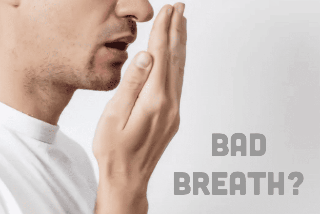Bad Breath?
 What gave it away? Perhaps it was the awkward shifting away from you in their seat. Perhaps it was the movement of their hand toward their nose or just the look on their face. Maybe it was their quick offering of a mint or stick of gum. Can you point to the sign that led you to wonder if you had bad breath?
What gave it away? Perhaps it was the awkward shifting away from you in their seat. Perhaps it was the movement of their hand toward their nose or just the look on their face. Maybe it was their quick offering of a mint or stick of gum. Can you point to the sign that led you to wonder if you had bad breath?
Thanks to a process called sensory adaptation, your brain filters out familiar odors, like your own breath. So you may not have even noticed the problem until you experience such social cues. Because of how difficult it can be to accurately smell your own breath, many people with halitosis (bad breath) are unaware of their situation.
Because of sensory adaptation, the cupping of a hand across the mouth and nose in an attempt to smell your own breath is likely not enough. So, unless you're willing to ask a trusted friend or family member to let you blow into their face, there are some other things you can consider.
Everyone experiences bad breath from time to time, especially after eating certain foods or taking some medications. While halitosis may stem from stomach, digestive, or other health issues, it typically stems from poor oral hygiene. Chronic halitosis (consistent bad breath that doesn't improve with simple measures like brushing and flossing) can be a sign of deeper dental issues like dry mouth and gum disease. Keep reading to know more about bad breath issues and solutions from a North Macon cosmetic dentist.
What causes Bad Breath?
Here are some contributing factors to watch for:
- Dry mouth can contribute to bad breath because saliva helps to remove odor-causing particles.
- White coating, particularly toward the back of the tongue, can signal an accumulation of food debris and bacteria.
- Unpleasant tastes that linger, such as bitter, sour, or metallic tastes, can be a sign of halitosis.
- Sore or swollen gums or toothaches can be indicators of problems that cause halitosis.
Gum disease (periodontal disease and gingivitis) can create inflammation and pockets where bacteria can thrive, leading to bad breath. Inadequate brushing, failure to floss properly, and other poor oral hygiene habits may allow food particles and bacteria to accumulate, contributing to halitosis.
Take the "Lick & Sniff Test." Lick the inside of your wrist, and give it a few seconds to dry. Then smell the area. If there's an unpleasant odor, it's also likely that you have foul breath.
How To Get Rid Of Bad Breath
Beyond brushing and flossing, here are some ways to help combat bad breath:
- Don't forget to brush your tongue when brushing your teeth.
- Be sure to properly clean bridges, dentures, retainers, and mouth guards.
- Keep your mouth moist.
- Replace your toothbrush (every three to four months at minimum).
- Change your diet.
- Schedule regular dental visits.
If bad breath persists despite good oral hygiene, it may be an indicator of something more serious. Definitely talk with your family dentist in North Macon for help in determining the cause and getting appropriate treatment. Stop the social stigma of bad breath before it starts. Contact Macon Smiles today!




